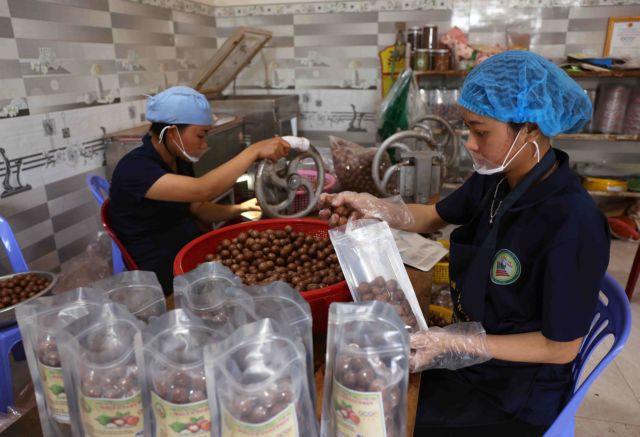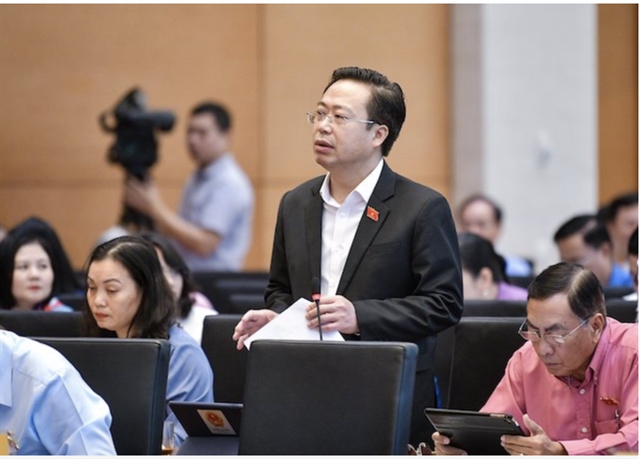 Politics & Laws
Politics & Laws

 |
| Deputy Nguyễn Đại Thắng of Hưng Yên Province’s delegation supports a total ban on driving under the influence of alcohol. —VNA/VNS Photo |
HÀ NỘI — Many National Assembly deputies supported the plan to absolutely ban driving with any detectable alcohol level.
The full-time deputies discussed the draft Law on Road Traffic Order and Safety in a meeting on Wednesday.
The law project was first discussed at the 6th session and will be submitted to the National Assembly (NA) for consideration and approval at the next session.
One of the contents that has drawn different opinions is whether to absolutely ban driving with any detectable alcohol concentration in blood and breathe, or to stipulate a certain allowable level of alcohol concentration before being fined.
Therefore, the Standing Committee of National Defence and Security designed two options to submit to the NA Standing Committee (NASC). One is a total ban on vehicle operation with any positive level of blood alcohol concentration (BAC) and the other is to allow motorbike control for drivers whose BAC is less than 50 milligrams per 100 millilitres of blood, or 0.25 milligrams per 1 litre of breath.
But the Standing Committee of National Defence and Security supported the first option.
Deputy Nguyễn Minh Tâm of Quảng Ngãi Province’s delegation also agreed with the plan to absolutely ban alcohol while driving, although admitting that this regulation would certainly impact a number of issues such as people's culture, and budget revenue from alcohol and beer.
Deputy Nguyễn Đại Thắng of Hưng Yên Province’s delegation said that during the first group discussion on this law project, he suggested considering the need to regulate thresholds when handling violations of alcohol concentration, but after comprehensive research on the advantages and disadvantages between the two approaches, he supported the absolute ban on alcohol concentration while driving.
Drivers who drink alcohol need to be strictly punished so as to gradually form a culture of “don't drive if you drink alcohol”, said Thắng.
Thái Thị An Chung, a deputy of Nghệ An Province’s delegation, also supported the absolute ban on alcohol while driving and noted that the recent enforcement campaign has raised people's awareness.
According to the deputy, the absolute ban on alcohol concentration in blood and breath will have an impact on economic development, but this regulation needs to be implemented for at least five more years to change the habit of using alcohol when participating in traffic, then reviewed and evaluated whether to apply the second option or not.
From another perspective, also supporting the first option, delegate Lý Thị Lan of Hà Giang Province’s delegation proposed to review and consider appropriate levels of penalties and punishments.
There must be a step-by-step roadmap over time to create awareness and culture when participating in traffic, she suggested.
Authorities should avoid abusing regulations to conduct rampant alcohol checks that cause people to resent the authorities.
The deputy cited that recently on social networks, there were many images that during the Tết (Lunar New Year) holiday, police went into poor rural areas checking alcohol levels and punish people.
"This caused offense, so we need to consider fines and be more flexible," Lý said.
Deputy Phạm Văn Hòa from Đồng Tháp Province had a different opinion.
He supported the plan to continue for drivers of cars, tractors and specialised motorbikes. But for motorcycles, it will apply a minimum threshold of 50 mg per 100ml of blood or 0.25 mg per one litre of breathing air.
The deputy suggested accepting a certain threshold of alcohol concentration, because a complete ban is hardly feasible.
Because in fact, there are cases drivers used alcoholic drinks the night before and the next morning there was still a small residual alcohol concentration in the blood/breath, but it did not affect the ability to safely drive a vehicle, so punishment is not reasonable, he said.
Therefore, he asked the NA and health authorities to consider the issue. — VNS








